The EU transparency register shows that 21 European based religious organisations, think tanks and non-governmental organisations, associated with an anti-abortion and a prolife agenda, allocated between 2,1 to 3.1 million Euro annually for lobbying or advocating in the European Parliament and other European institutions.
Simultaneously, this includes legal advocacy organisations, many of which are faith-based, are systematically filing legal suits in cases concerning abortion, euthanasia, bioethics and similar faith-related topics to many European courts, including the European Court of Human Rights.
The organisations are based in Belgium, France, Spain, Poland as well as Austria, Switzerland and the USA.
Hundreds of annual tax returns analysed by Nacional and other partners in European Investigative Collaborations (EIC) also reveal that between 2012 and 2017 six-US based conservative organisations which are focused on anti-abortion and prolife causes, passed at least 19.4 million USD (17.2 million Euro) to their own subsidiaries and to organisations with a similar agenda which are based in Europe.
These six organisations, which spread their religious and conservative agenda in the U.S. and on other continents, collected more than 429 million USD of contributions, gifts and grants from other U.S. foundations and citizens over the same period, including from known conservative American billionaires and associates of Donald Trump. Part of this significant sum of money donated to faith-based causes is influencing public opinion and legal cases in Europe today.
A large number of these organisations include representatives who have appeared members of Agenda Europe, a “secure, closed network of pro-family, pro-life, pro-freedom allies” according to a 2014 presentation by Sophie Kuby, now Director of Strategic Relations & Training at Vienna headquarters of U.S-financed faith-based legal advocacy organisation, the Alliance Defending Freedom (ADF) International.
The pan-European advocacy group ‘Agenda Europe’, which began in 2013, and calls itself an “informal” network, and holds an annual summit, which last year was co-partnered with U.S-funded conservative organisations such as the Acton Institute and ADF International.
“Agenda Europe is a loose network of mainly civil society associations, representatives of the Catholic church, other churches, Catholic academics and politicians, who network, discuss and strategise on how to advance a religious world view inside Europe, nationally and in European institutions,” according to Neil Datta, secretary of the European Parliamentary Forum on Population & Development (EPFPD), a network of members of parliaments in Europe concerned with sexual and reproductive health.
These policy areas are against abortion, some forms of contraception, comprehensive sexual education, gender as a social construct rather than biological reality, and in favour of the traditional heterosexual patriarchal family and gender roles within that family, argues Datta.
“In religious freedom, for them my rights as a religious individual are higher than national secular laws,” he argues, “I see initiatives and arguments in this direction from all Agenda Europe members.”
One of Us: Defenders from the Moment of Conception
The lobbying federation ‘One of Us’ has 48 member organisations from 19 European member countries today, and allocated 100,000 to 200,000 Euro annually for lobbying activities in 2017.
Founded in 2013, the organisation’s main activity is “the defence of life from conception until natural death,” according to Ana del Pino, Executive Coordinator of European Federation ‘One of Us’.
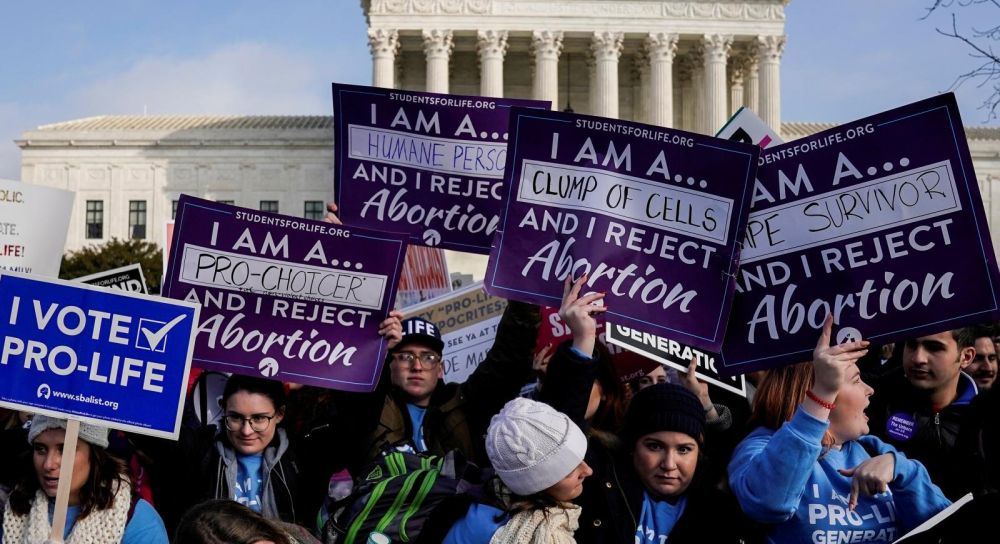
FILE PHOTO: Anti-abortion marchers rally at the Supreme Court during the 46th annual March for Life in Washington FILE PHOTO: Anti-abortion marchers rally at the Supreme Court during the 46th annual March for Life in Washington, U.S., January 18, 2019. REUTERS/Joshua Roberts/File Photo Joshua Roberts
In 2013, the group collected almost two million signatures for a European Citizens’ Initiative, demanding the EU end “the financing of activities which presuppose the destruction of human embryos, in particular in the areas of research, development aid and public health.”
Ana del Pino tells us that One of Us is “not satisfied with the current response of the EU institutions” concerning the defence of human life.
“Our goal is to continue presenting a real alternative for Europe, faithful to human dignity and human life protection as we understand should be done by an advanced society,” she adds.
Some members of the federation “One of Us” dedicate additional funds for lobbying at an European level. Alongside the Polish foundation “Jeden Z Nas” (‘One of Us’ in Polish) is Spain’s “Professionals for Ethics” on 17,320 Euro and France’s “Fondation Jérôme Lejeune” with up to 10,000 Euro in a single year. Among its members is also the European Center for Law and Justice (ECLJ), a legal advocacy organisation with financial support from the United States.
Recently, a high profile legal case involved Frenchman Vincent Lambert, a 42 year-old quadriplegic on life-support. His parents wanted the doctors to keep assisting his life, and at least one lawyer in their defence was connected to the ECLJ, which acts as Amicus Curiae in many courts.
Alliance Defending Freedom: calling for action on abortion
Another organisation which receives significant funds from the U.S. and allocates an estimated 200,000 to 300,000 Euro to lobbying European institutions is ADF International, which “advocates for the right to life of the unborn before the world’s most powerful institutions.”
This faith-based organisation, headquartered in Vienna, is a subsidiary of US based conservative Alliance Defending Freedom (ADF), which allocated 8.4 million USD between 2012 and 2017 for operations in Europe. The Austrian branch also has subsidiaries in Brussels, London, Strasbourg and Geneva.
An influential Christian legal interest group in the U.S, which has won nine legal cases brought to the US Supreme Court, ADF calls for direct action to prevent abortion: “Over the past 24 years, a surging pro-life movement has forced the closure of 75% of surgical abortion businesses in America. That’s the good news. But over 500 abortion facilities still exist. There’s more work to be done.”
In Europe, ADF International recently supported a Swedish midwife in the Swedish Courts, because she refused to perform abortions.
In the area of religious freedom, ADF International has been active. Following a campaign by ADF to petition members of European Parliament to support Christians in the Middle East the European Commission created a Special Representative for Freedom of Religion and Belief in 2016. This post was occupied by career politician Jan Figel of Slovakia, former chairman of the country’s Christian Democratic Movement (KDH).
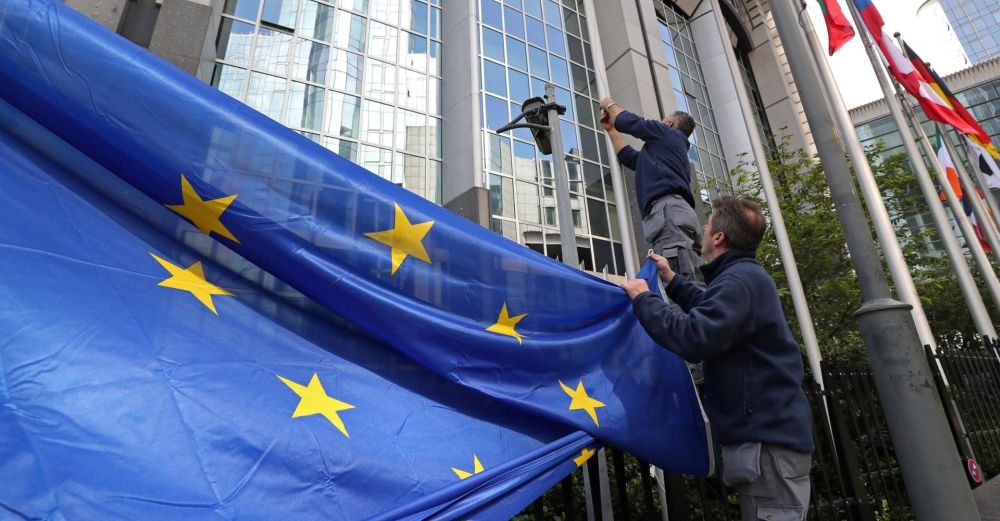
Workers adjust a European flag outside the EU Parliament ahead of the EU elections in Brussels Workers adjust a European flag outside the EU Parliament ahead of the EU elections in Brussels, Belgium, May 22, 2019. REUTERS/Yves Herman Yves Herman
This move was celebrated by ADF International. “We congratulate Ján Figel on his appointment to this vital position,” said ADF International’s Sophie Kuby. “We are confident that this new envoy position will give a voice to the voiceless and start a new chapter in which the EU takes its human rights obligations more seriously.”
ADF and Sophie Kuby did not respond to questions on what would be considered a policy success at EU lobbying level.
Success in lobbying for religious freedom
The number of faith-related organisations lobbying EU institutions on issues of policy has been increasing, according to the EPFPD’s Neil Datta, who twenty years ago only saw two or three organisations campaigning.
“Now there are 10 to 12 groups present with access to parliament who are treated with credibility,“ he says. “They are able to influence certain narratives and messages which serve to advance their goals in a range of areas.”
In the area of religious freedom, he argues such organisations can get their message across within the EU, and officials show them respect. “In sexual and reproductive health, they have not been effective and that is because progressive groups and politicians have been able to neutralise them,” he adds.
But arguably one of their successes, which fulfilled their policy goals, was in 2013, when the European Parliament rejected the non-binding ‘Estrela Report’ by Portuguese Social Democrat MEP Edite Estrela, giving everyone in the EU the right to make “their own informed and responsible choices on their sexual and reproductive life.”
This was narrowly defeated by members of European Parliament, who decided such measures should only take place at a national level.
However Datta argues that to judge their victories may be premature. “A number of groups are new on the EU scene, so they don’t yet have have policy successes or advances,” he says. “They have only been around for three or four years, first they arrive, they establish an office in Brussels, start making contacts, and advancing their own points of view and gradually build up. They haven’t had many policy successes, because they haven’t tried yet.”
Connected organisations
Another significant lobbying group is the International Organisation for Education and Liberty in Education (OIDEL), founded in 1985 in Switzerland. According to its own presentation, this is “a non-governmental organisation specialised in the right to education and freedom of education, with Consultative Status with United Nation’s Economic and Social Council (ECOSOC), UNESCO and the Council of Europe.” According to the EU transparency register, the organisation allocated 200,000 to 300,000 Euro in 2018 for lobbying or advocating. However, one of their representatives is listed as a group member of the anti-choice Agenda Europe.
OIDEL prepares the ‘Freedom of Education Index – Worldwide Report 2016 on Freedom of Education’ in collaboration with Italian conservative prolife organisation Novae Terrae Foundation, led by Italian Luca Volonte, a right-wing politician suspected of corruption concerning funds from Azerbaijan, who is also on the Agenda Europe member list.
Their joint report was publicly presented in 2016 by the Federation of Catholic Family Associations in Europe (FAFCE), which has another representative on the list. OIDEL did not respond to questions, including a question on whether they identify themselves as a prolife organisation.
FAFCE is listed on the EU transparency register, allocating 50,000 to 100,000 Euro annually for lobbying in the EU Parliament. This is a federation of Catholic family associations from 13 European countries which “ensures a political representation for family interests from a catholic perspective”.
In 2013, FAFCE launched a collective complaint under the European Social Charter (ESC) against Sweden for failing to allow doctors to refuse to abort babies, if their conscience was against the practice.
In reply to questions, the federation states it is “a Catholic-inspired movement representing families in Europe” which also holds a participatory status with the Council of Europe.
Its promotion is based on “the family as the first place where every human life is naturally welcomed and as the place of personal fulfilment and of education of people… We believe that the care of family ought to be a central issue of EU policies and current individualistic approach is in fact contradictory with the aspiration of people and the reality of their daily lives.”
Polish Perspective: From Europe’s Pro-Life Heartland
From eastern Europe, lobbyists with a pro-life mission included legal think tank Ordo Iuris and Jeden Z Nas (One of Us), as well as Ukraine’s religious organisation Public Advocacy. The Polish constitution does not allow women to access an abortion on request, and Ordo Iuris helped draw up a controversial law in Poland in 2016 giving full human rights to the foetus, outlawing abortion except when the mother’s life is in danger. Following mass protests, the law did not pass parliament.
Ordo Iuris’s estimated costs of lobbying in 2017 was between 25,000 and 50,000 Euro. In a statement to our questions the organisation said: “The Ordo Iuris Institute’s mission is inter alia to introduce full protection of human life from conception until natural death, the protection of the identity of marriage and family, the protection of freedom of speech, freedom of conscience and economic freedom.”
The think tank added: “recent public polls conducted in Poland show that Polish society supports the protection of human life from conception as well as the protection of the identity of marriage and family. However, in some European countries and EU institutions this attitude of Polish society does not meet with understanding. There is a deficiency of a social dialogue, respect and openness between the European institutions and NGOs.”
Fellow Polish pro-life organisation Jeden Z Nas estimated lobbying costs of 25,000 to 50,000 Euro in 2018. In speaking about its activity, its secretary general Jakub Bałtroszewicz pointed out the role of his group is to ensure the EU does not promote “anti-life” policies on member states or outside of the bloc.
“We are aware that when it comes to politicians – especially members of European Parliament – we are in a minority,” says Bałtroszewicz. “We don’t expect that this will change, however we expect that European Union will not impose any anti-life, anti-family law on to the member states or promote anti-life and anti-family position in third countries as it does not have competence to do so. Our goal is to make sure that the European Union will stop interfering in any pro-life matters, and should strictly remain a sole competence of member states.”
Top Spender: The Catholic Church
Among the groups we analysed, the biggest annual spending for lobbying European institutions comes from the Secretariat of Comece (Commission of the Episcopates of the European Union), an association of the Catholic Church episcopal conferences in member states of the European Union (EU) which officially represents those episcopal conferences at EU institutions.
Founded in 1980, Comece traditionally represents the Church’s interests in Europe. According to the EU transparency register, it allocated one million to 1,250,000 Euros in 2018 for lobbying or advocating. Comece details the Church’s vision to “champion human dignity” and the Gospel of Life that proclaims “each human person must be protected from conception until natural death.”
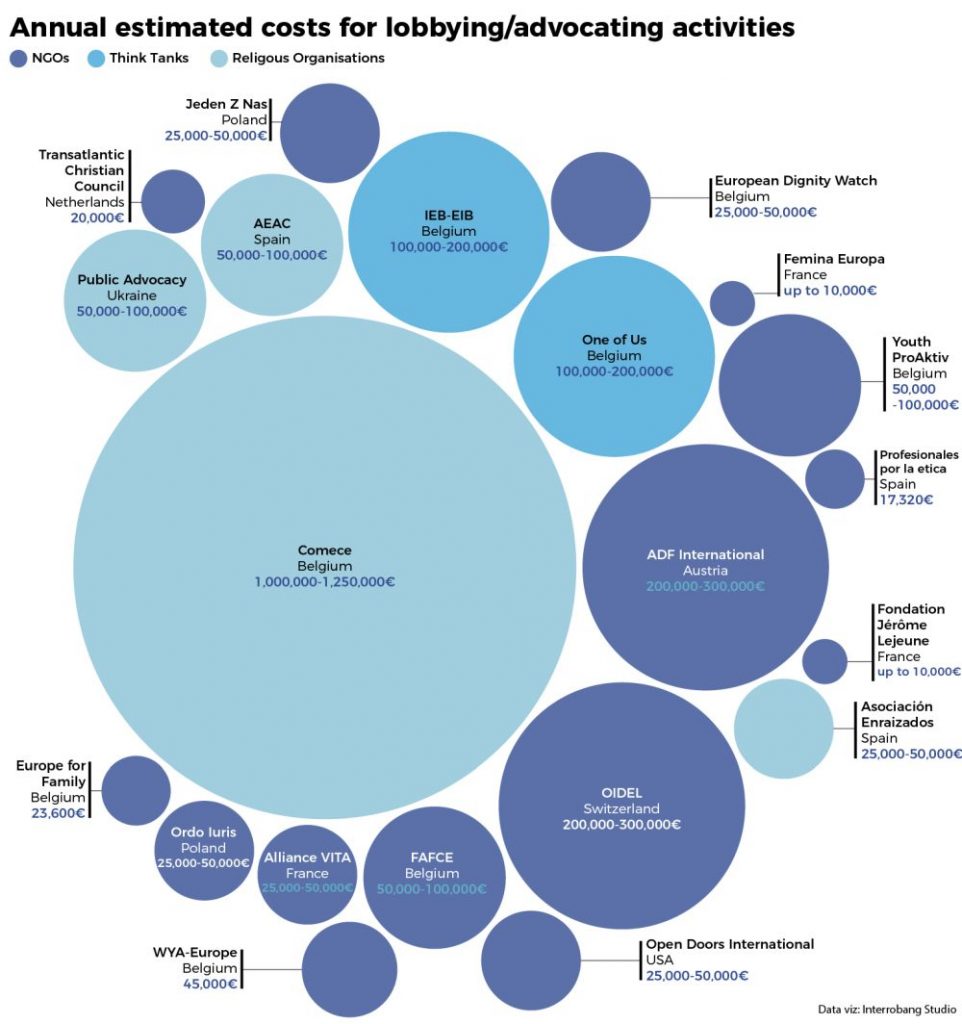
In 2014 Comece regretted the EU commission’s decision to drop the European Citizens’ Initiative ‘One of Us’, which collected almost two million signatories from European citizens asking for the EU to end financing activities connected to embryo destruction.
It also claims that abortion should not be an EU matter and has, in the past, called that EU funds must not be used for abortions in developing countries.
In 2017, Comece and the European Center for Law and Justice (ECLJ), the European branch of the conservative anti-choice American Center for Law and Justice, organised a conference in Brussels called ‘Preventing Abortion in Europe’.
At an EU level, Alessandro Di Maio, media and communication officer at Comece, argues that Comece present a Catholic perspective on EU policies, which are those topics falling under the competence of the EU. The association focuses on a variety of different issues, such as on asylum seekers, data protection issues, and the rights of Roma.
“Comece is not lobbying but advocating,” adds Di Maio. “Since abortion/euthanasia fall under the competence of EU Member States, the dialogue between COMECE and the European institutions does not include them.”
Youth-focused group with Pro-Life members secures EU funds
Another major name which is lobbying in the EU is the World Youth Alliance, a US-based charity which is against abortion. The WYA has six regional offices and claims it has 300,000 members. To join online, each member must sign a prolife charter that states: “We are convinced that the intrinsic dignity possessed by every human being from conception to natural death is the foundation of everyone’s right to life.” Also accredited to the United Nations in a consultative status, WYA has a European branch with three lobbyists in the European Parliament and allocated spending estimated at 45,000 Euro on lobbying in 2017, according to the register.
Meanwhile its European affiliates in Croatia, Austria and Belgium have won grants worth a total 63,000 Euro in EU financing through the Erasmus program for youth-based initiatives. The NGO is also organising a Good Governance conference in the European Parliament in July 2019.
Members of the following organizations who have appeared on the Agenda Europe list and who allocate costs for lobbying in the European Parliament and to EU institutions also include: Institut Européen de Bioéthique-European Institute of Bioethics (100,000-200,000 Euro), YouthProAktiv, Public Advocacy (50,000-100,000 Euro), European Dignity Watch, Alliance VITA, Open Doors International, Asociación Enraizados (25,000-50,000 Euro), Europe for Family (23,600 Euro), Transatlantic Christian Council (20,000 Euro) and Femina Europa and Fondation Jérôme Lejeune, with up to 10,000 Euro allocated for lobbying annually. All these organizations did not respond to our questions.
How do these numbers compare with other organisations?
The amounts of spending by Christian-inspired groups with an anti-choice message active in lobbying the European parliament can compare with those lobbying for a pro-choice message.
For example, the European Parliamentary Forum on Population & Development, which published a critique of Agenda Europe, is listed as a non-governmental organization in the EU transparency register, and allocates between 200,000 to 300,000 Euro for lobbying or advocating in the European Parliament and other European institutions.
Similarly, the U.S-financed International Planned Parenthood Federation European Network (IPPF), which advocates for sexual and reproductive rights and gender equality, allocated an estimate of between 100,000 and 199,999 Euro in 2017. These figures are similar to those for the anti-abortion ADF International.
US billionaires and Trump’s associates funding European prolife movements
Hundreds of annual tax returns analysed by Nacional and other partners in European Investigative Collaborations (EIC) also reveal that between 2012 and 2017 six-US based conservative organisations, think-tanks and foundations, which are focused on anti-abortion and prolife causes, passed at least 19,4 million USD (17,2 million Euro) for its own subsidiaries and to organisations with a similar agenda, based in Europe.
These six organisations, which spread their religious and conservative agenda in the U.S. and elsewhere, collected more than 429 million USD of contributions, gifts and grants from other US foundations and citizens over the same period, including from known conservative American billionaires and associates of Donald Trump.
Part of this significant sum of money, donated to faith-based causes, is influencing public opinion and legal cases in Europe today.
The NYC-based World Youth Alliance (WYA), which lobbies in the EU through its Belgium office, is financed by the Chiaroscuro Foundation, chaired by Catholic billionaire Sean Fieler, which has given the organisation 1.86 million USD between 2012 and 2017 and, in the past, by smaller grants from Catholic groups the Knights of Columbus, The Community Foundation for Greater Atlanta and The Raskob Foundation for Catholic Activities. Fieler was a Catholic advisor to Donald Trump’s 2016 Presidential campaign. Also the conservative philanthropic John Templeton Foundation donated 571,000 USD to WYA over the same period. During this time, the WYA donated 644,000 USD to European operations.
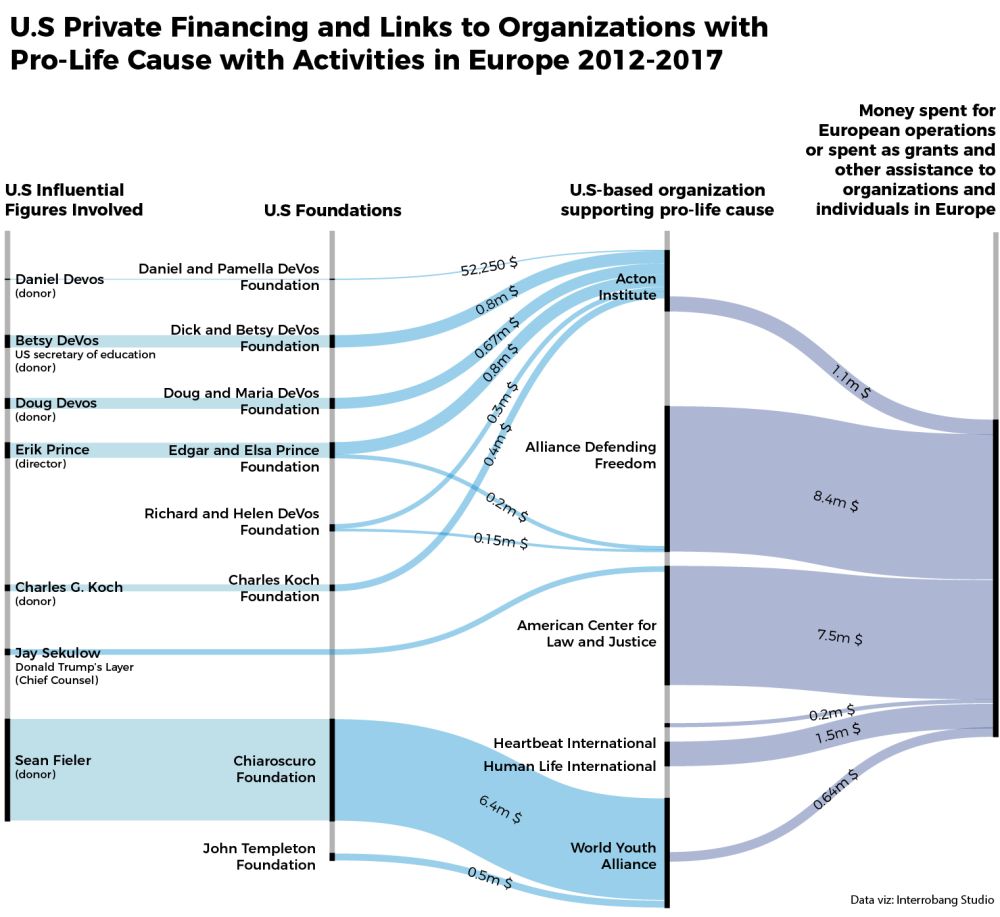
The Chiaroscuro Foundation and World Youth Alliance did not respond to our questions.
The Arizona-based Alliance Defending Freedom (ADF), which also lobbied in the EU, transferred 8.4 million USD to Europe, according to its tax returns. These took the form of grants to recipients located in Europe, programme services as human rights legal work, legal advocacy and training or scholarships.
Between 2012 and 2017 ADF collected 228 million USD in donations in the United States. Among the known donors are Richard and Helen DeVos Foundation, which donated 150,000 USD, and Edgar and Elsa Prince Foundation, which contributed 180,000 USD over the same period.
Richard DeVos, a billionaire who founded a global corporation focused in health, beauty and home care products, Amway, passed away in 2018, but his son is married to Betsy DeVos, current secretary of education in Trump’s government. Betsy DeVos is also a sister of mercenary entrepreneur Erik Prince, founder of the controversial private military contractor Blackwater, which was renamed Xe Services in 2009, when Prince left the organisation. Prince serves as a director of the Edgar and Elsa Prince Foundation.
The DeVos Family and its foundations have also donated 1.2 million USD combined to another US prolife organisation in Europe, the Acton Institute. Based in Michigan, the institute transferred 1.1 million USD for its European operations. A significant amount went to its Italian subsidiary in Rome.
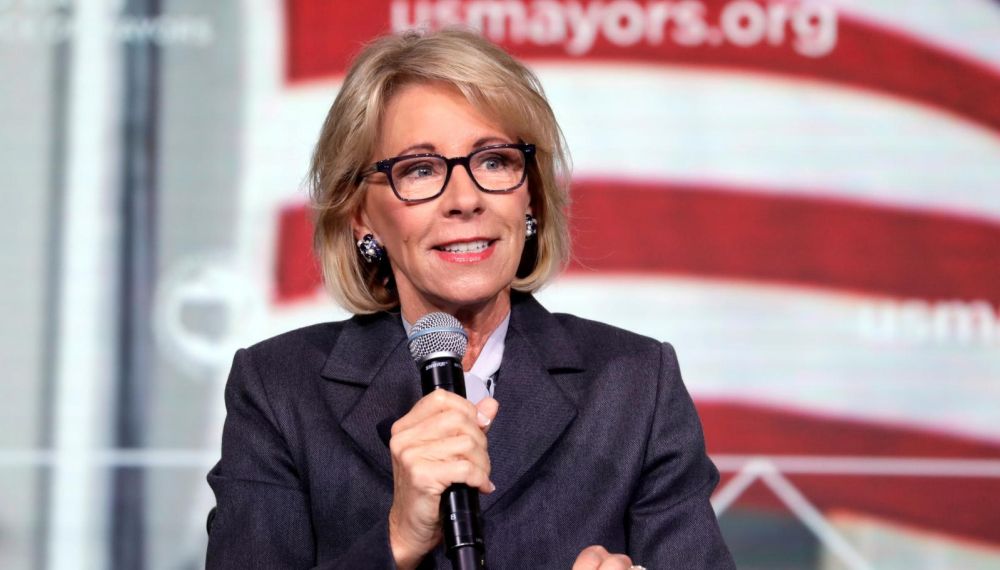
FILE PHOTO: Education Secretary Betsy DeVos speaks at the Conference of Mayors winter meeting in Washington FILE PHOTO: U.S. Education Secretary Betsy DeVos speaks at the United States Conference of Mayors winter meeting in Washington, U.S., January 24, 2019. REUTERS/Yuri Gripas/File Photo Yuri Gripas
Between 2012 and 2017, the Acton Institute collected 58 million USD of donations. Edgar and Elsa Prince Foundation also donated an additional 820,000 USD and conservative billionaire Charles G. Koch donated 400,000 USD to the Acton Institute over the same period. The Acton Institute co-partnered on the last ‘Agenda Europe’ summit in 2018, alongside ADF International and the European Christian political party, the European Christian Political Movement. (ECPM)
No foundation mentioned above responded to journalistic questions. Richard and Helen DeVos Foundation and Edgar and Elsa Prince Foundation were not reachable.
Another US prolife organisation is Washington D.C-based American Center for Law and Justice (ACLJ), which transferred 7.5 million USD for European operations between 2012 and 2017. It appears that almost all of this sum (7.1 million USD) was given to the European Center of Law and Justice (ECLJ), another legal advocacy group which is active in landmark legal prolife cases in European courts. Altogether ACLJ received 111 million USD over the same period.
ACLJ was created by American TV evangelist Pat Robertson in 1990. Its European subsidiary was co-founded by Jay Sekulow, who served in Donald Trump’s legal team in 2018.
ECLJ is a member of European prolife initiative ‘One of Us’, which allocated additional 100,000 to 199,999 Euro for lobbying EU institutions in 2017.
The ACLJ states it had been “intricately involved in many” of the heartbeat bills now being passed in States such as Ohio, Georgia and Mississippi, which limit abortions to six weeks, when a supposed heartbeat renders the child human, “and will continue to defend them in court.”
The ECLJ is involved in advocacy, education and litigation, focusing on religious freedoms and “the dignity of the person” with the European Court of Human Rights and other mechanisms afforded by the United
Nations, the Council of Europe, the European Parliament, and the Organisation for Security and Cooperation in Europe (OSCE).
Therefore many legal cases regarding abortion and prolife issues at European courts and European Court of Human Rights represented by ECLJ lawyers, when financed by the advocacy group, are funded by US conservative donors. ACLJ and its subsidiary ECLJ, which had two representatives on the Agenda Europe list, did not respond to EIC’s questions.
Human Life International (HLI), based in Virginia, is a prolife missionary organization with more than 100 affiliates in the world. It is not funded by the Vatican or any government, but “depends on the support of individuals and foundations dedicated to building a Culture of Life”. According to tax returns it collected 17.1 million USD from US donors and transferred 1.5 million USD to its own activities or as a grants to entities in at least 15 European countries between 2012 and 2017. Human Life International declined to answer our questions.
An international network of pro-life pregnancy resource centers, Heartbeat International, has a vision “to make abortion unwanted today and unthinkable for future generations”. The organisation collected 15.2 million USD between 2012 and 2017 and allocated 190,000 USD for its operations in Europe. Heartbeat didn’t respond to our questions.
Europe: the new battleground in culture war
Because of limitations of financial statements and tax returns of non-governmental organisations, sums from the above mentioned charities and foundations seem to be only the tip of the iceberg. This money flow seems to be fully legal and legitimate if used only for political debate, however it is in the public interest to disclose who is financing organisations with a prolife and anti-abortion agenda in Europe, specifically when money comes from other continents.
However, massive financial support of US conservative donors to European subsidiaries and organisations with similar beliefs show that strategies from the other side of the Atlantic are becoming the new reality in Europe. Besides the Catholic church and other older traditional religious organisations, many new NGOs and think tanks have been founded in Europe, which attempt to change public opinion, policies and laws in the European Union member countries against abortion, same-sex marriage, euthanasia and embryonic research, and other issues which are a central part of Christian religious doctrine.




























Komentari